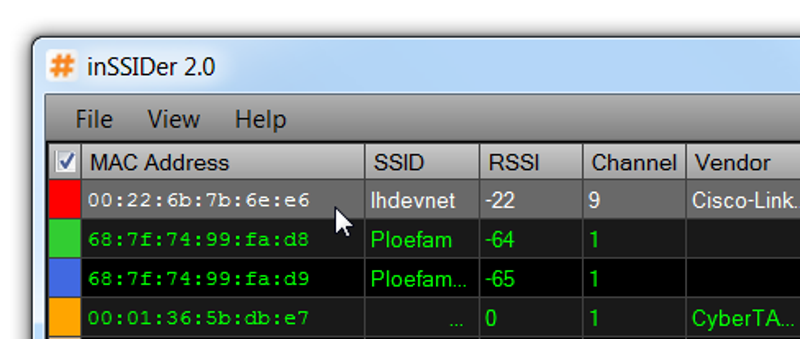Crack Ssid Name Convention
Hi, Just wondering what other folks use as a format for their WIFI SSID names. I have to name a WIFI SSID for staff use, and one for guest use. Part of my thinking is that I should keep the purpose of the network vague (except in the case of guest access) so I am not directing hackers to the company network (servers, etc).

How to fix Failed to associate with SSID in reaver and aircrack-ng. Email discard. Sign convention in simple harmonic motion. UPC UBEE EVW3. WPA2 Password Reverse Engineering, rev 3. TL; DR: We reversed default WPA2 password generation routine for UPC UBEE EVW3. This blog contains. Creative Ssid Names. Why use a default SSID or follow a boring name convention. Nerd With These WiFi Network & Computer Names. Now type the command to build wireless restrictions like insert SSID name. Turn off WPS since reaver can crack this in. Recover the Network Name from a Wi-Fi network that's not broadcasting its SSID.
I also want to go with a guest SSID name that is extremely obvious for the public to select when looking for open WIFI. So far I have: 'Companyname-Staff' for employees (example: Apple-Staff) 'Companyname-Guest' for guest access (example: Apple-Guest) I am also contemplating: 'Companyname' (example: Apple) 'Guest-WIFI' with no reference to any company.
Change Ssid Name
As a company, should I be prefixing any Guest access network with the name of the company? When they connect to it, I do have a company logo that comes up with a disclaimer, thanks to my firewall. Thanks for any tips or advice, OC. Our company WiFi is just an access point connected to our domain, only given out to work devices. We don't broadcast the SSID and that sucker is locked down with a 30 character password.

We have a completely different external IP just for the guest network, companynameguest2.4G/5G We broadcast this SSID but it's locked down, guests are provided the password or users that wish to connect personal devices. We do have Open DNS settings so there is no questionable content being downloaded.
There is no point in hiding the SSID, there are so many free programs out the that can still find the hidden wireless networks. Just call it something sensible, bear in mind the length of it, on mobile device there is less space so keep it short. I think you should identify the guest one, just having Guess Wi-Fi makes it look dodgy to me ( remember the Free-Public Wi-Fi 'virus?
) Just use you company name, abbreviated if needed for the staff, and with '-guest' suffixed for the guest wireless, I think you may be putting more thought then is need and you should be considering things like, as Captain Frostbite stated, ensuring the guest Wi-Fi has no chance of connecting to your production network. Also consider what the users of the staff wireless have access to. If they have access to something, consider that anyone with the motivation can get access to it. One excellent security measure would be to use certificates for authentication in place of a passphrase. On the guest SSID, the bandwidth is throttled and uses Norton DNS for content filtering, I also setup a splash page where our terms and conditions and legal mumbo jumbo are at, and you need a voucher. Once you enter the voucher you can proceed.
The voucher is good for one device only and expires after a year (vouchers can be customized to work with more than one device, more or less bandwidth if need be and their expiration). The employees also use the guest SSID for their personal phones/tablets. The guest SSID also uses isolation so all the devices on the guest SSID cannot see or talk to one another. The guest SSID is also separated from the primary network, so people on it cannot see anything on our private network. Brianwhelton wrote: There is no point in hiding the SSID, there are so many free programs out the that can still find the hidden wireless networks. That's just wrong. It would be correct to say that hiding the SSID does little to conceal it from someone looking to hack it.
Funny Ssid Name
But Jill on her iPhone and Billy on his laptop are not going to find it as they drive past your building. If it keeps half the people from trying to log in with 'test' and 'admin,' it's worth it. More importantly, it keeps users from trying to connect to it because they thought it was the public Wifi. And that's worth a lot of saved support calls.
As far as naming, I named our public networks 'Public Wifi,' and 'Guest Wifi.' Our private ones are usually something simple like MWS for Maplewood Secure or CHS for Cheshire Hall Secure. As has been mentioned, only IT staff have the passwords for these and only IT-owned devices get connected.